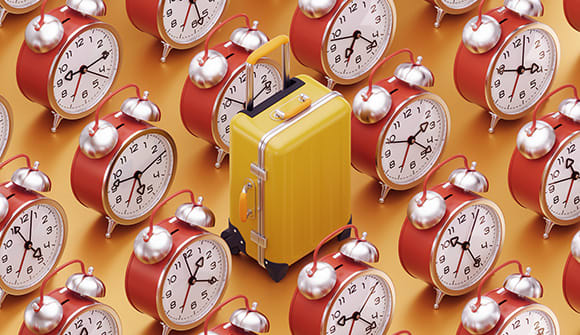Drained from jet lag?
Leave exhaustion at home with these tips to adjust to time differences.
Article Author: Juliette Allen
Article Date:

You hop off the plane at your long-awaited destination filled with excitement about what’s to come. But whether you’re traveling to see family, exploring a new country or hopping on a plane for any other reason, a faraway destination can come with an unwanted companion: jet lag.
“The basic problem that we label as ‘jet lag’ is really just our own ‘body clock’ internal rhythms being out of sync with our environment,” explained Joel Ahlgrim, DO, a family physician with Baptist Primary Care. “The problem isn’t with the flight itself, although travel can be exhausting, but with the sudden change in time zone. We can’t sleep when we should, and we’re drowsy when we would prefer to be alert.”
Health risks of jet lag
Is the sudden change in time zone a mere inconvenience, or can it have serious implications for your health? Traveling somewhere far away every now and then is unlikely to cause any long-term harm, although it may make you feel “out of it” temporarily. Frequent international travel, however, may have longer-lasting effects.
“Over time, chronically disrupted sleep for any reason contributes to a host of health problems, from metabolic and cardiovascular issues to mental health concerns,” said Dr. Ahlgrim. “In the short term, accidents can increase because of impaired alertness.”
Adjusting in advance
So, are you doomed to deal with first-day fatigue, or can you fight back against jet lag? The key may be to start the process long before you board the plane.
“Our bodies naturally function with a daily rhythm that corresponds roughly to a 24-hour cycle, but we can ‘adjust the clock’ based on cues including light exposure, physical activity and even social interaction. These adjustments work best through gradual shifts, not major jumps,” said Dr. Ahlgrim.
If you’ll be shifting your schedule later by traveling westward, try staying up a little longer in the days leading up to your trip. If you’re traveling east, try waking up an hour or two earlier in the morning and exposing yourself to bright light first thing.
“After you arrive, walk in bright sunlight. Caffeine in the morning can be therapeutic here,” Dr. Ahlgrim said. “Melatonin at bedtime may help you fall asleep when you’re not naturally tired, but it’s always good to check with your primary care doctor first. For westward travel, evening light exposure and activity to help keep you awake may help.”
As for what to avoid, Dr. Ahlgrim cautioned that the tempting mid-day nap may feel good in the moment, but can interfere with your ability to adapt to the new time zone. Same goes for alcohol, which can make you feel drowsy, but doesn’t lead to restful sleep.
“Embrace the local time as much as possible upon arrival, even if you’re tempted to sleep in,” he said. “The tools you have the most control over are light exposure and your own physical activity. And don’t forget to stay hydrated.”
If you have a big trip planned and want to get ahead of jet lag, or you’re having other sleep issues, your primary care doctor can provide guidance for what may help. To find the right provider for you, click here or schedule an appointment online.


